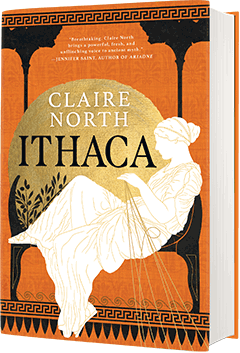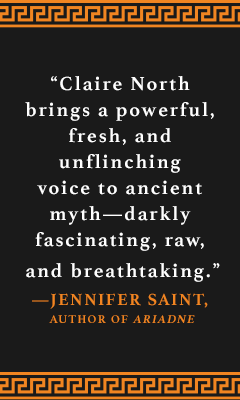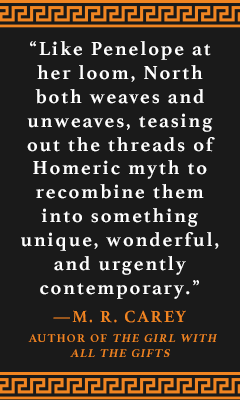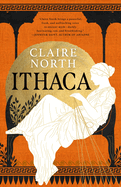Ithaca
by Claire North
Claire North (The First Fifteen Lives of Harry August; The Pursuit of William Abbey) offers a new take on a familiar tale with Ithaca, a richly imagined, thought-provoking novel of Penelope's trials during the Trojan War and its aftermath. The forgotten or misrepresented women and goddesses of ancient Greece bring joy, sorrow, humor and wit.
A lengthy space of time falls between The Iliad's story of the Trojan War's conclusion and The Odyssey's story of Odysseus's protracted homecoming. On the island of Ithaca while its king, Odysseus, is absent, Penelope, his queen, rules uncertainly, beset by unruly suitors wishing to become king, and the hopes and ambitions of her son, Telemachus, an infant when his father went to war and a young adult by the time he returns. Into this gap comes Ithaca, which follows the challenges faced by Penelope and the other women--queens, wives, mothers, goddesses, slaves--who surround her and fight their own often overlooked battles.
The Homeric myths are well-known and familiar territories for many readers and indeed many writers, who have reimagined and retold these stories in abundance. But despite the richness of such retellings, Penelope remains an enigma, and North's contribution to the genre is unique and welcome. While the Ithacan queen is in some respects its protagonist, Ithaca is narrated by the goddess Hera, wife (and sister) to Zeus, and frequently represented as bitter, jealous and vengeful. Hera's interest in Penelope is self-serving: as the goddess of women, wives, queens and motherhood, she resents the ways in which Penelope is disregarded by her male counselors, her absent husband, her suitors and her son. While Hera's stepdaughter, Athena, is chiefly concerned with the hero Odysseus, Hera is entirely here for the women. In fact, it is not Penelope whose fate concerns her first: "No one ever said the gods did not have favourites, and it is Clytemnestra I love best, my queen above all, the one who would be free."
Clytemnestra's crime of husband-murder is reframed by the recounted sins of Agamemnon, and when the murderess-queen hides on Ithaca, readers are reminded that she and Penelope are cousins. Next arrive Orestes and Elektra, who seek to avenge their father's death; Orestes is near-mute and disengaged, while his sister is a magnetic, powerful force, barely remembering that she must at least seem to defer to the will of a man: "aware that she has been perhaps a little too forceful... [she] adds, 'My brother will issue his commands shortly.' " Clever Penelope is more practiced at the trick of subtly sliding her wise points into conversations while seeming to demur. Telemachus is a bit silly, a boy hoping to be a man. Odysseus is entirely off-screen, "groan[ing] in the nymph's pearly bed." Both Artemis and Athena make appearances, annoying their stepmother with their own agendas.
Penelope is of course harassed by the unwelcome suitors who place the queen in a sort of stalemate, as she can neither accept their offers of marriage (both because Odysseus may still be living, and because to accept one would be to provoke the others quite possibly to war) nor send them away (because of the culturally sacred host's obligation). In this version, Penelope is additionally beset by pirates attacking her island nation--pirates dressed as Illyrians but wielding the short swords of Greeks. There seems to be intrigue afoot, offering a whodunit mystery subplot for Penelope and her subtle female counselors (in contrast to her blustering male ones) to investigate. Women warriors lurk in the shadows of this Ithaca. And North does not forget the maids, who are also slaves, and also in some cases Trojans: "Death to all the Greeks," one of them repeatedly mutters under her breath. The maids are frequently bedmates of the suitors; but to what end, and with what choice in the matter?
Thus is Ithaca the story not only of Penelope, Hera and other queens and goddesses, but of less famed women as well, down to the teenaged village huntress who opens these pages. Hera is quick to remind her audience that the stories that get passed down are written by poets, whose narratives may be purchased, and who rarely notice the contributions of women: "That girl is not remembered now"; "No poet will ever do her homage." "Freedom only increased the efficacy of her work, though there is not a single poet in all of Greece who would dare breathe of such an outcome." Hera's voice is humorous, whimsical, imperious, frequently scornful. But she is also surprisingly easily cowed by the other Olympians, knowing that Zeus holds power over her. "I was a queen of women once, before my husband bound me with chains and made me a queen of wives." While this story is on its face about Penelope, Clytemnestra, Elektra and the rest, Hera is an engrossing and masterful character in her narration.
North's prose is clever, funny and as wise as Penelope herself, with an eye for pleasing images as well as deeper meanings. In her capable hands, this ancient landscape is both fresh and timely. Ithaca is the first in a trilogy, and having come to know this three-dimensional Penelope, North's readers will eagerly await the next two installments. --Julia Kastner








